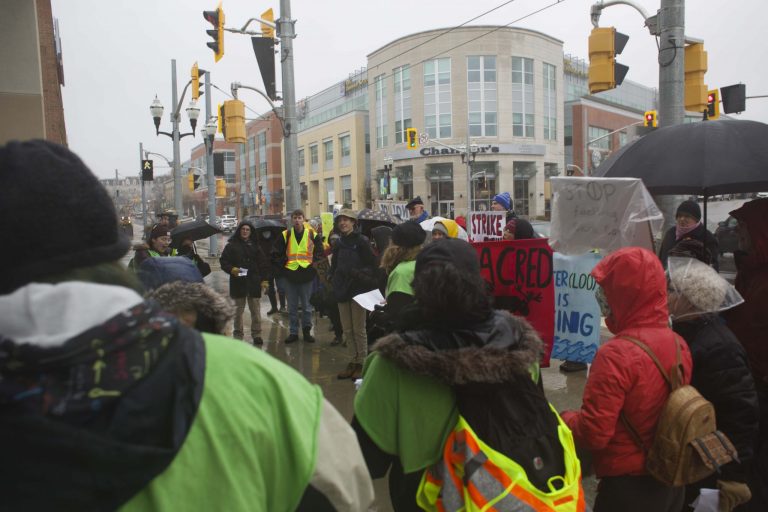On Mar. 25, approximately 50 community members joined a protest organized by Fossil Free UW against investments into fossil fuels of the five major Canadian banks in.
The group walked up and down King St. and hung posters on branches of three the banks on the street—these were RBC, Scotiabank and BMO.
Petra Duff, fourth year mathematical physics student at the University of Waterloo (UW), said that in addition to holding UW accountable to their divestment goals, the group now also focuses on advocacy on a larger scale.
“Banks are the number one funders of fossil fuels and if we are going to transition away from fossil fuels and go to green economy, they’re the ones that have to take the first step,” Duff said.
Michelle Angkasa is an environment and business student at UW and a member of Fossil Free UW. She said she is driven by a sense of fairness, especially since the global north is insulated from some of the first and worst impacts of climate change.
“…[Banks] are the largest funders of fossil fuels in Canada, RBC in particular. And they’re propping up an industry [that’s] actively killing people,” Angkasa said. “But we need to stand up for the people who don’t have as much privilege as us.”
Members of other organizations were also present, including members of the Seniors Action Network and the Waterloo chapter of the Citizens Climate Lobby. Members of the latter collected signatures on a petition demanding the Government of Canada enact the concepts in the Climate-Aligned Finance Act.
The petition demanded more enforcement of alignment with climate goals, including establishing duties for existing roles and organizations, requiring action plans and annual reporting on progress, ensuring climate expertise on boards of directors, and more.
The movement for addressing climate change is created from the ground-up, Angkasa said.
“When we come together, we have so much collective power…we can send a strong message today with the banks to say that we will not tolerate this anymore,” she said.



Shirley Irish, a former homemaker and a regional resident for 65 years was also present at the rally. She regularly attends rallies and protests for social justice issues.
Irish has great-grandchildren up to age 12 and she is an active community member to help create a better future for them.
“2050 isn’t very far away and each time the UN puts out a new notice about climate, it’s worse instead of better, so that’s why [I’m here],” she said.
“I don’t believe in just looking after me, it seems our world nowadays is pretty concentrated on ‘me first’ ideas whereas First Nations people think about seven generations before they make decisions and I think we should be doing that, too,” Irish said.
Organizers were grateful to rally attendees like Irish, who showed support despite the severe weather.
Some volunteers of Fossil Free UW went on to visit some of the banks after the rally and spoke with bank managers and employees, encouraging them to show support for green investment.
“[We’re] hoping to spark a meaningful conversation. Last time we did it we had like a beautiful conversation with the managers at Royal Bank,” Duff said.
“They always give us the time to talk freely about everything that we’re concerned about,” Duff said.
Both Duff and Angkasa recommended that community members do research into the banks they use. They said that moving money into a credit union is a more democratic option.
“So, if you’re banking at one of the big five banks, they’re investing billions of dollars in the fossil fuel industry. And you can choose, as an individual, to move your money and send a message to your bank that this is not to be tolerated,” Angkasa said.
“I encourage everyone to research what their banks investments are and what they can do to make greener, as well as check out credit unions,” Duff said.
“If you as an individual have money in a credit union, then you’re a shareholder and you get a choice on what happens and what they put their money in. So, it’s a much more ethical option for banking,” she said.
For more information, visit bankingonabetterfuture.org or fossilfreeuw.ca.

